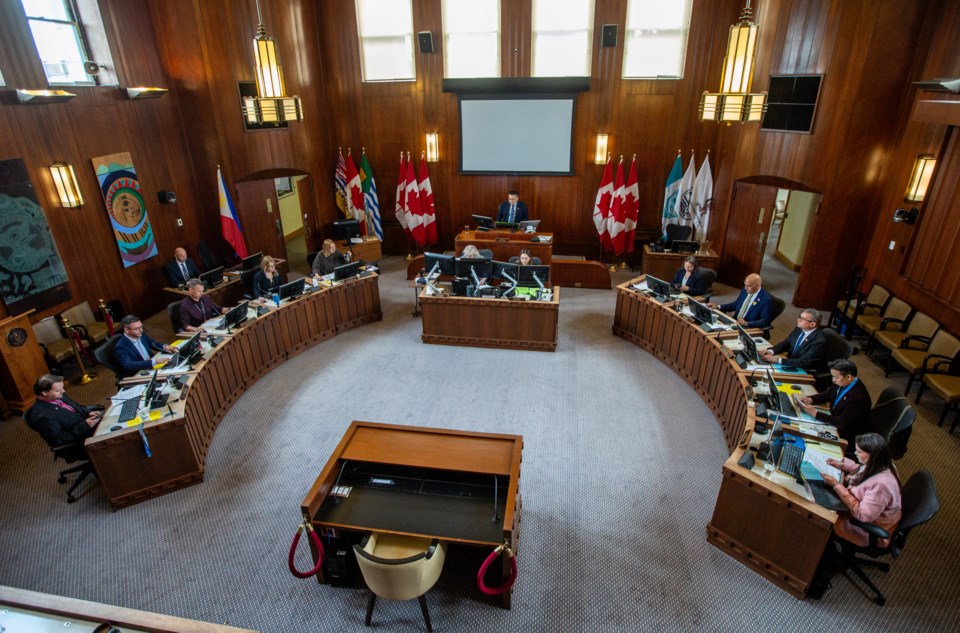It will be Mayor Ken Sim’s last budget until the civic election in October 2026.
When he and his colleagues meet in December to finalize the 2026 budget, it will likely be the last time the current makeup of the 11-member council decides on a property tax increase for residents.
That’s unless all seek re-election and win back their seats.
Since Sim and his ABC Vancouver majority were elected in October 2022, the property tax increases have been 10.7 per cent in 2023, 7.28 per cent in 2024 and 3.9 per cent for 2025.
Sim has pointed to the hiring of more police officers and firefighters as reasons for the significant hikes in the first two years. Money also went to Vancouver Coastal Health to hire mental-health workers.
At a council meeting in June, Sim was successful in introducing a motion that directs the city’s finance team to consider three alternative scenarios for a property tax hike in 2026: 2.4 per cent, one per cent and zero per cent.
Each one of those scenarios includes an additional one per cent to cover the cost of tackling the city’s infrastructure deficit.
No matter how an increase is broken down, the reality for taxpayers is that another tax hike is coming in 2026, and it will be one per cent or more, along with increases in utility fees.
Paul Mochrie out, Donny van Dyk in
The day after the council meeting, then-city manager Paul Mochrie issued a memo to staff that explained some “immediate measures” were being implemented in the interest of “building capacity to avoid extensive and across-the-board impacts” in 2026.
“These measures are intended to manage expenditures and create options within the approved 2025 budget to absorb anticipated cost increases,” Mochrie wrote.
“Measures include deferral of non-essential hiring and additional controls on certain categories of expenditure, including travel, training, equipment purchases and external service contracts.”
In a subsequent email to BIV, Mochrie provided some clarity about whether new staff would be hired. Council heard at its June meeting that the number of full-time staff had increased from 9,490 in 2024 to 9,665 this year.
“While we are deferring non-essential hiring as part of these interim steps, this does not amount to a full hiring freeze,” he said. “Through the remainder of 2025, we will continue to fill vacant positions as necessary to avoid significant reductions in services to the public.”
Added Mochrie: “We recognize that these changes raise questions for our staff. We are committed to keeping our staff informed as we are able and supported through this period of time.”
Mochrie is now gone and has been replaced by Donny van Dyk, who has left his city manager position in Delta and will be on the job in Vancouver in September. According to Sim, he and Mochrie “mutually agreed that it was the right time for a leadership change” at the City of Vancouver.
It is not known whether the mayor’s push to finish the final year of his term with a tax hike as low as one per cent had anything to do with Mochrie’s departure. Mochrie declined an interview request.
'Number of material risks or unknowns'
Sim’s call for property tax scenarios came despite a report from the city’s finance team that projected a total property tax increase in 2026 of seven per cent. The team also warned “a number of material risks or unknowns” could impose additional costs over and above that projection.
The report said increases in costs to maintain existing service levels in 2026 is driving what could be a property tax hike in the five to six per cent range, along with a one per cent increase to address the infrastructure deficit.
“While the rate of consumer price inflation has moderated relative to recent years, the city’s costs to maintain existing service levels continue to increase at a rate exceeding [Consumer Price Index] inflation,” the report said.
Historical under-investment in renewal of critical infrastructure and amenities, coupled with increasing cost of construction, “present a significant demand on property tax and utility fees to fund the continuing serviceability of the city’s assets,” the report said.
The politics of property tax hikes, along with the reality of costs continuing to increase at the city, serve as a backdrop for a survey the city has posted on its website to get public input on the budget.
The city’s communications team issued a news release last month asking for residents to state their budget priorities for 2026. The survey is open until Sept. 14.
All feedback will be summarized in a public report to council ahead of the final budget vote in December.
X/@Howellings




